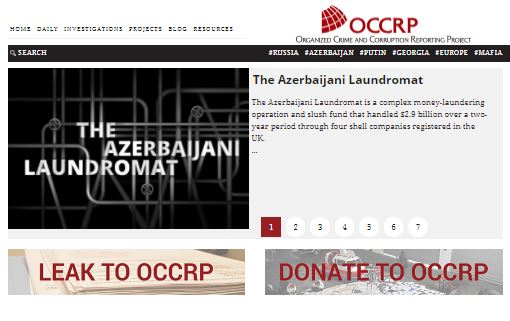
European politicians and others advocating for the Azerbaijani regime of Ilham Aliyev and his policies in the Karabakh conflict were paid with dubiously acquired funds through what a major media investigation called a financial ‘laundromat’.
According to data published by the Organized Crime and Corruption Reporting Project (OCCRP), working in collaboration with major newspapers such as The Guardian and Le Monde, the Aliyev regime used four accounts at the Estonia branch of the Danske Bank to launder some $2.9 billion over 30 months.
The transactions were intended to hide the origin and the ultimate destination of most of the funds and are dated between 2011 and 2014. The accounts were also used to make purchases of anything from diamonds to auto parts to ATVs to large quantities of wallpaper. About $10 million (less than 0.5% of the funds involved) could be linked to specific payouts to lobbyists.
Most of the money likely originated from embezzled oil revenue, but some may have come from borrowings abroad. Shortly before parts of the leak were first made public last April, the International Bank of Azerbaijan, the country’s largest, defaulted on its debt payments.
Aside from cash transfers from Azerbaijan, the Russian government agency that oversees foreign sales of military equipment, Rosoboronexport, deposited some $29 million into the ‘laundromat’ that apparently represented ‘commission payments’ off of Russian military sales to Azerbaijan contracted in 2009. Some of the payments were arranged on June 24, 2011, the same day as Aliyev visited the helicopter plant in Kazan on the sidelines of the Armenian-Azerbaijan summit held there.
Hungarian media noted that more than $7 million in laundered funds began showing up in Hungarian banks in July 2012, just weeks before the extradition of convicted axe-murderer Ramil Safarov to Azerbaijan. While it has long been suspected that the Aliyev regime used financial incentives to have the murderer of Armenian officer Gurgen Markaryan transferred, no concrete link has been established so far.
In an unusual arrangement, Azerbaijan used more than $500,000 of the funds designated for flood victims in Azerbaijan to pay the husband of UNESCO Director General Irina Bokova. A former senior Bulgarian diplomat, Bokova has been an active promoter of Azerbaijan in recent years. In June 2011, she was accused of censoring a UNESCO photo exhibit of the historic Armenian cross-stones (khachkars) of Julfa, Nakhichevan, destroyed by the Azerbaijani government in previous years. The Bulgarian government said it was investigating.
More than $3 million were channeled to three members of the Parliamentary Assembly of the Council of Europe (PACE), where Azerbaijani lobbying was previously well-documented by the European Stability Institute (ESI). In addition to blocking or watering down criticism of Aliyev’s domestic policies, PACE adopted a series of resolutions related to the Karabakh conflict that leaned in Azerbaijan’s favor, most recently in January 2016. The ‘laundromat’ was also used to channel more than $2 million to a public relations firm to place Aliyev- and Azerbaijan-friendly articles in news media and at least $1.85 million to Azerbaijani lobbyists in Washington.
Aliyev’s aides have dismissed the publications as a smear campaign “designed by philanthropist George Soros and the world Armenianism.” Previously, the Azerbaijani government paid for a report called “The Armenian Connection,” apparently intended to counter the ESI findings, suggesting that Armenians were working with human rights groups – some of them supported by Soros – trying to undermine Azerbaijan and the Aliyev regime in European countries. Last July, Aliyev reportedly told his Russian counterpart Vladimir Putin that ethnic Armenians were also behind the recent strains in Azerbaijan-Russia relations.
Having shut down critical domestic media, the Azerbaijani regime has recently turned its attention to critics abroad. This week’s ‘laundromat’ publication coincided with a legal case in France, where the Azerbaijani government sued two journalists for calling it a dictatorship in a 2015 TV program. Earlier this year, Azerbaijan imprisoned a Russian Israeli blogger for his writings attacking Aliyev.









